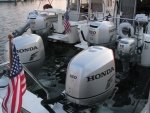We carry our tools in a soft bag. Pliers: large water pump, needle nose, large and small Vise Grips. Wrenchs: 10" and 6" Cressent, set of ratchet in SAE and Metric Kobalt. Socket Set: 3/8" and 1/4" full set in metric and SAE. In the truck, I carry a 1/2" set with torque wrench and beaker bar.
Screw drivers: combination Irvine: multip, including Robertson #1 and #2, phillips, and slot. Intermediate double phillips/slot screw driver, Large screw driver blade in 3/8 socket set, for lower unit screws. Jewelers Screwdrivers set, as well as offset ratchet. Full Allen Key set in Metric and SAE. ViseGrip Chain or Strap Wrench to remove filters.
Digital volt meter and 12 volt trouble light. several 36" pieces of wire with alligator clips on each end. 12 feet of #14 wire. Small propane torch, with solder, heat shrink adhesive covering, Crimpers, with full set of fittings, including all wire sizes on the boat--both butt and ring connectors, as well as spade connectors.
Electrical tape, rescue tape,
Good wire strippers, and good pair of diagonal cutters.
SS wire, Electrical Zip Ties, multiple nuts bolts screws, fuses, the above electrical fittings, JB weld, 5 minute epoxy (in tubes), etc are all in a about 10" x 14" Plaino double sided tackle box.
I also carry a battery operated multi speed Dremel Tool, with a set of drill bits, and the collets for these, cutter from 1/8" to about 3/8", sanding drums, flat sanding discs, cut off wheels for plastic and metal, etc. This allows drilling almost any size hole I need from 1/16" up to over an inch.

